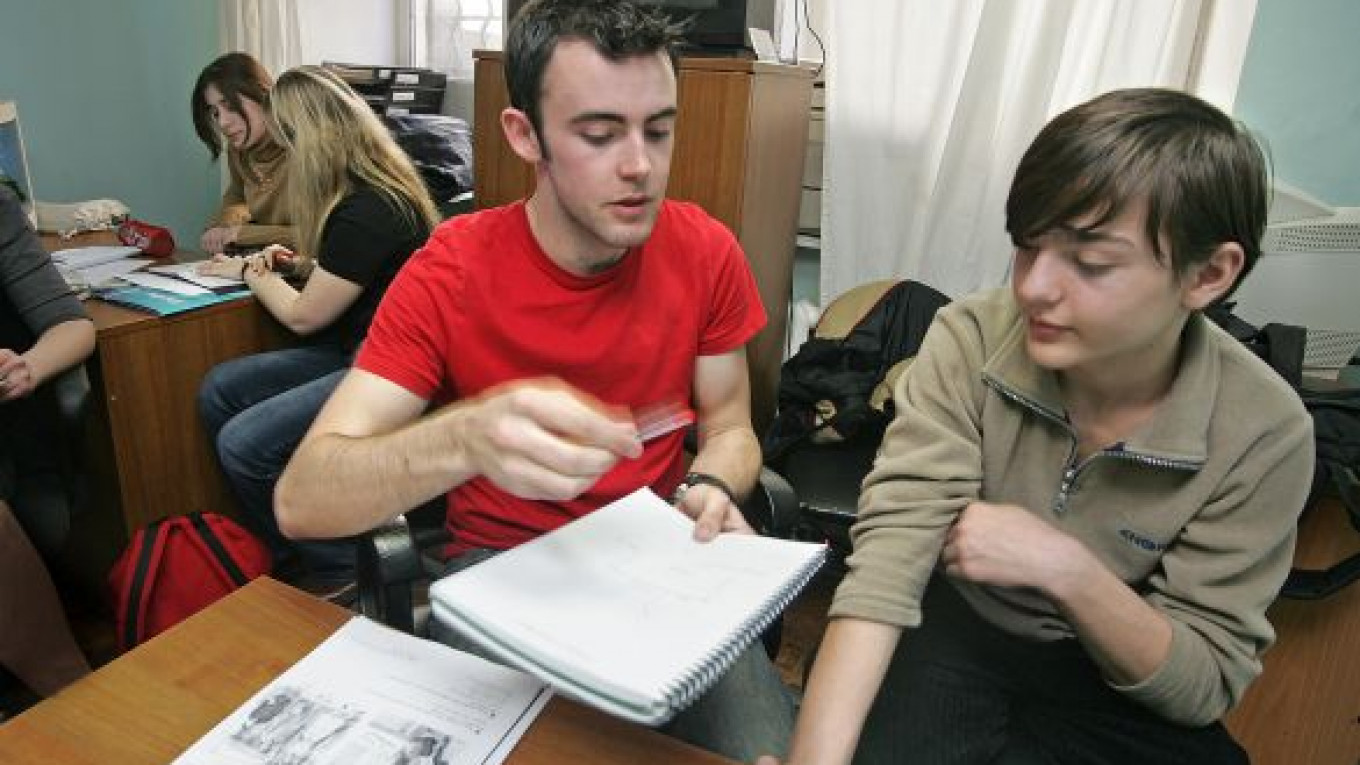“Trash and hell will follow,” blogger Dr-lex wrote about a plan to overhaul the high school system that was released for public discussion by the Education and Science Ministry.
“Our children will be left face to face with … a school for zombies,” blogger Suzjavochka chimed in, lashing out at the reform's main staple: reducing the number of mandatory subjects and introducing classes in patriotic education.
The draft of the reform, released to a blast of patriotic fanfare last month, is stirring up sharp criticism from opponents, who fear that the new program will not educate teens but be used to brainwash them into becoming docile servants of the authorities.
But educators said the reform was quite sensible and, in fact, long overdue.
The changes will be implemented this fall, Grigory Ivlev, a State Duma deputy with United Russia, said in a statement late last week.
The high school program for grades nine through 11 currently consists of about 15 subjects, most of which are mandatory. Students can only specialize in a certain subject by enrolling in a special school that places an emphasis on that area of study. The system is widely considered too rigid, and the abundance of subjects leads to students overworking.
The reform introduces a more flexible schedule, capping the number of subjects at 10, with only three remaining mandatory: physical education, general safety and a new subject called Russia in the World.
Students can choose from among six groups which track they wish to pursue in their studies: Russian or native language and literature, foreign languages, social sciences, mathematics, natural sciences, and art or some another course chosen by the school. The total number of course hours would remain the same.
The reform brings the Russian education system closer to those in Western countries. In Finland and Australia, high school students usually take six to eight subjects, while in Britain the figure stands at five to seven.
“It's a big step forward for Russian schools,” said Irina Abankina, head of the Institute of Education Development with the Higher School of Economics.
Criticism of the reform came quickly after its co-authors — Lyubov Kezina, former head of Moscow City Hall's education department, and former Deputy Education Minister Alexander Kondakov — played up its patriotic components while unveiling it at a session of United Russia's patriotic club last month. Skeptics concluded that the document was the Kremlin's response to xenophobic rioting near Red Square earlier that month and said it aimed to mass-produce uneducated patriots.
The Russia in the World subject, meant as a combination of history, geography, economics and other subjects, has faced particularly withering scorn because it lists among its goals to teach teens to “stand against the falsification of history at the expense of Russia's national interests.”
Kondakov, co-author of the reform, added fuel to the fire by calling patriotism more important than math. "It's a priority task for any state to bring up a citizen and patriot," he told Gzt.ru last month. "It's even more important than mathematics or physics.”
He also linked the Dec. 11 rioting, which saw thousands of youth clash with police by the Kremlin walls while chanting nationalist slogans, to a lack of patriotism among young people.
But despite concerns that education will be sacrificed for the sake of patriotism, educators said the changes would give students greater freedom in choosing their coursework and allow them to absorb more information.
“The document doesn't say that students will study less, but that they will be able to chose and focus seriously on certain fields,” Abankina, head of the Institute of Education Development, said by telephone.
Lyubov Dukhanina, an education expert with the Public Chamber, praised the new standard as “really progressive.”
Reducing the number of subjects will benefit gifted teens, who will have the opportunity to learn more about the subjects of their choice, Dukhanina said.
“Modern children are very smart. They often stay ahead of the school program and need to develop further,” she said.
As for the controversial Russia in the World subject, the criticism is premature because no study programs for it have been presented so far, Abankina said.
The draft of the reform, which has been published on the ministry's web site for public discussion until Feb. 15, will be “reworked,” a ministry spokesman said by telephone Monday. He did not elaborate.
A Message from The Moscow Times:
Dear readers,
We are facing unprecedented challenges. Russia's Prosecutor General's Office has designated The Moscow Times as an "undesirable" organization, criminalizing our work and putting our staff at risk of prosecution. This follows our earlier unjust labeling as a "foreign agent."
These actions are direct attempts to silence independent journalism in Russia. The authorities claim our work "discredits the decisions of the Russian leadership." We see things differently: we strive to provide accurate, unbiased reporting on Russia.
We, the journalists of The Moscow Times, refuse to be silenced. But to continue our work, we need your help.
Your support, no matter how small, makes a world of difference. If you can, please support us monthly starting from just $2. It's quick to set up, and every contribution makes a significant impact.
By supporting The Moscow Times, you're defending open, independent journalism in the face of repression. Thank you for standing with us.
Remind me later.






